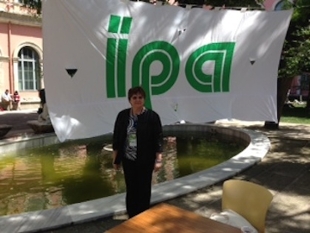Play is critical for development
News
During 30 years of experience in studying play, both as a public-school teacher and as a college professor, Dr. Dorothy Justus Sluss has encountered 200 or more definitions of play. One she particularly likes that touches on the most important aspects is “activities that occur when children are free to choose what they want to do, when they engage in ‘as if’ or pretend, when there is frivolity or fun. It may not result in laughter, but it has to be pleasurable.”
Sluss’ career in education has been evenly split between serving as a classroom teacher and as a higher education professor at JMU, the College of William and Mary, Clemson University and East Tennessee State University. The author of “Supporting Play in Early Childhood” and “Supporting Play: Birth to Age Eight” and co-editor of “Investigating Play in the Twenty-First Century,” she is the current president of the International Play Association/USA. Sluss, a professor of early, elementary and reading education at JMU, also serves as a member of The Strong National Museum of Play’s National Toy Hall of Fame selection committee and an advisory member for Sesame Street Children’s TV for STEM programs.
“After watching children in the classroom play and engage in other activities I realized the power of play,” Sluss said. “Children learn more when they play than at any other time. We can talk to children and we can stand in front of them and tell them what they need to know, but it really isn’t until they engage in constructing that information on their own and practicing the acquisition through play that they really learn the topic.”
That’s why play pedagogy or using play to inform curriculum is so important for children.
Instead of using flashcards bearing individual words for reading instruction, Sluss prefers to set up play centers with objects labeled with their corresponding names. Within a play center set up as a kitchen, children incorporate the words into their play, and with a teacher’s guidance, can use the learned words to construct a menu or compile a grocery list – showing their mastery of certain words.
In her study of play and play pedagogy, Sluss has observed many truths, among them:
- Play is an area that has benefits cognitively, socially, physically – all domains are enhanced by play.
- Children will play even in the direst circumstances. They will find a way to play.
- Play unifies the fields of education, therapy, health and recreation. It’s one thing that everyone understands. Everyone “gets” play.
- Play is an adaptive activity. If we couldn’t play, we wouldn’t adapt as humans. That’s why the highest mammals play.
- Children need time to play, unencumbered by adults watching them.
“Play is important for our individual development,” Sluss said. “It, especially in the form of games, is important because such interactions help transmit our culture, our heritage” as rules are conveyed and common play forms are passed to younger generations.
To learn more about the importance of play and play pedagogy, check out the recently updated International Play Association/USA website.
# # #

